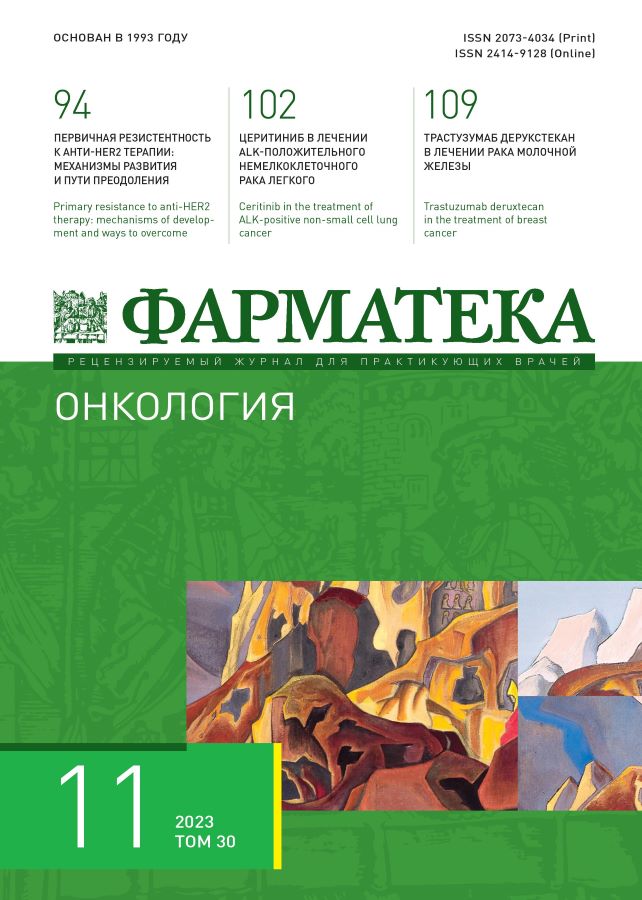Venous thrombosis and malignant gynecological diseases: the place of direct oral anticoagulants in prevention
- Authors: Ulrikh E.A.1,2
-
Affiliations:
- Almazova National Medical Research Center
- Petrov National Medical Research Center of Oncology, North-Western State Medical University n.a. I.I. Mechnikov
- Issue: Vol 30, No 11 (2023)
- Pages: 20-23
- Section: Reviews
- Published: 22.10.2023
- URL: https://journals.eco-vector.com/2073-4034/article/view/625750
- DOI: https://doi.org/10.18565/pharmateca.2023.11.20-23
- ID: 625750
Cite item
Abstract
Venous thromboembolism (VTE) is a common but preventable cause of death in women after surgery for gynecological cancer. the use of unfractionated heparins or low molecular weight heparins for a month is the standard of thromboprophylaxis after major abdominal and pelvic surgery for malignant neoplasms. Direct oral anticoagulants (DOACs) are approved for the treatment of VTE in the general population. This regimen has significant advantages over other types of anticoagulant regimens, in particular the oral administration without the need for laboratory monitoring. The review presents the benefits of using DOACs based on updated information from completed and ongoing clinical trials.
Full Text
About the authors
E. A. Ulrikh
Almazova National Medical Research Center; Petrov National Medical Research Center of Oncology, North-Western State Medical University n.a. I.I. Mechnikov
Author for correspondence.
Email: rectorat@szgmu.ru
ORCID iD: 0000-0002-2701-8812
Dr. Sci. (Med), Prof.
Russian Federation, St. Petersburg; St. PetersburgReferences
- Wang Y., Zhou H., Zhong G., et al. Development and Validation of a Nomogram to Predict the Probability of Venous Thromboembolism in Patients with Epithelial Ovarian Cancer. Clin Appl Thromb Hemost. 2022;28:10760296221095558.
- Gressel G.M., Marcus J.Z., Mullen M.M., et al. Direct oral anticoagulant use in gynecologic oncology: a Society of Gynecologic Oncology clinical practice statement. Gynecol Oncol. 2021;160:312–21.
- van Hylckama Vlieg M.A.M., Nasserinejad K., Visser C., et al. The risk of recurrent venous thromboembolism after discontinuation of anticoagulant therapy in patients with cancer-associated thrombosis: a systematic review and meta-analysis. EClinicalMedicine. 2023;64:102194.
- Ebina Y., Uchiyama M., Imafuku H., et al. Risk factors for deep venous thrombosis in women with ovarian cancer. Medicine (Baltimore). 2018;97(23):e11009.
- Lyman G.H., Carrier M., Ay C., et al. American Society of Hematology 2021 guidelines for management of venous thromboembolism: prevention and treatment in patients with cancer. Blood Adv. 2021;5(4):927–74. Blood Adv. 2021;5(7):1953. doi: 10.1182/bloodadvances.2021004734.
- Li A., Garcia D.A., Lyman G.H., et al. Direct oral anticoagulant (DOAC) versus low-molecular-Weight heparin (LMWH) for treatment of cancer associated thrombosis (cat): a systematic review and meta-analysis. Thromb Res. 2019;173:158–63.
- Graul A., Latif N., Zhang X., et al. Incidence of venous thromboembolism by type of gynecologic malignancy and surgical modality in the national surgical quality improvement program. Int J Gynecol Cancer. 2017;27:581–87.
- Walker A.J., Card T.R., West J., et al. Incidence of venous thromboembolism in patients with cancer – a cohort study using linked United Kingdom databases. Eur J Cancer. 2013;49:1404–13.
- Cohen A.T., Maraveyas A., Beyer-Westendorf J., et al. Patient-reported outcomes associated with changing to rivaroxaban for the treatment of cancer-associated venous thromboembo-lism – The COSIMO study. Thromb Res. 2021; 206:1–4.
- Neumann I., Rada G., Claro J.C., et al. Oral direct factor Xa inhibitors versus low-molecular-Weight heparin to prevent venous thromboembolism in patients undergoing total hip or knee replacement: a systematic review and meta-analysis. Ann Intern. 2012;156:710–19.
- Guntupalli S.R., Brennecke A., Behbakht K., et al. Safety and efficacy of apixaban vs enoxaparin for preventing postoperative venous thromboembolism in women undergoing surgery for gynecologic malignant neoplasm: a randomized clinical trial. JAMA. Netw Open. 2020;3:e207410.
- Swaroop M., Borden L., Locklear T., et al. Postoperative thromboprophylaxis with oral rivaroxaban versus subcutaneous low-molecular- Weight heparin: a retrospective comparison in women with a gynecologic malignancy. Gynecol Oncol. 2021;162:S239.
- Ramacciotti E. (October 22–2025 July 15). A multicenter, open-label, prospective, randomized, active-controlled study on the efficacy and safety of oral rivaroxaban versus enoxaparin for venous thromboembolism prophylaxis after major gynecological cancer surgery. Identifier NCT04999176, 2020.
Supplementary files








